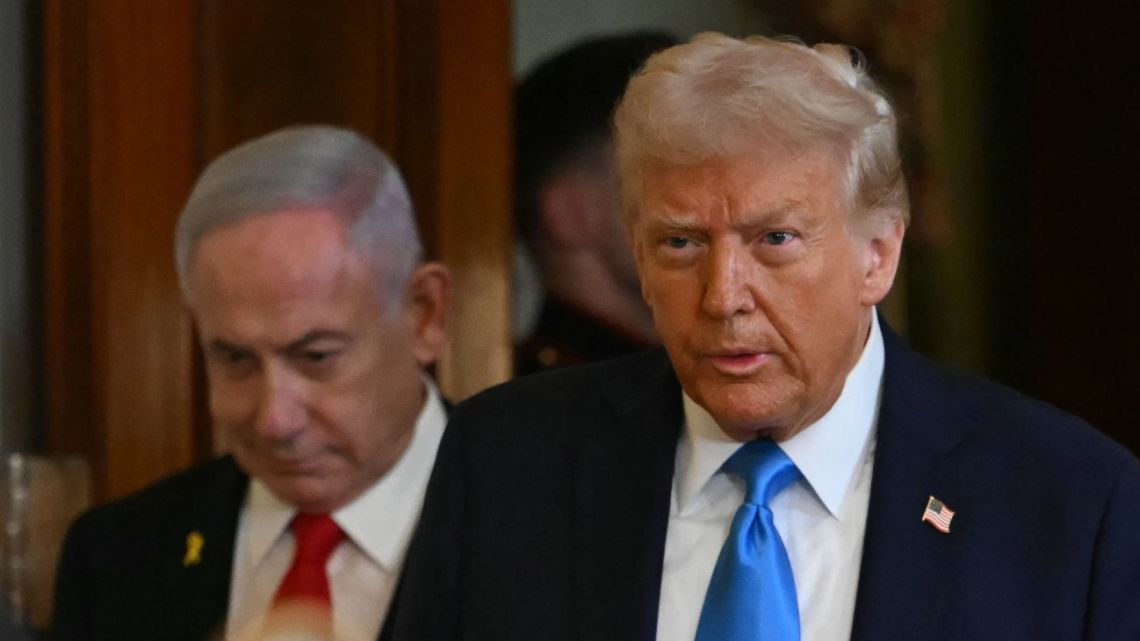Saudi Arabia Reaffirms Commitment to Palestinian Statehood Amid Talks of Israel Normalization

Saudi Arabia has made it clear that it will not formalize diplomatic relations with Israel unless a Palestinian state is established, addressing recent remarks from Israeli Prime Minister Benjamin Netanyahu. The statement, issued by Saudi officials, was in direct response to Netanyahu’s confident claims about striking a peace deal between Israel and Saudi Arabia during a press conference with U.S. President Donald Trump. Although Saudi Arabia has not officially recognized Israel, the kingdom has taken significant steps towards a thaw in relations since 2020, engaging in discussions that could lead to normalization in exchange for strategic agreements, including a U.S. defense pact and support for a civilian nuclear program.
However, Saudi Arabia remains firm in its stance on Palestinian sovereignty, insisting that the establishment of an independent Palestinian state, with the Gaza Strip, the West Bank, and East Jerusalem as its capital, is a non-negotiable precondition for any diplomatic ties with Israel. This statement underscores Saudi Arabia's long-standing commitment to the Palestinian cause and the broader Middle East peace process.
The Stalemate: Israel, Saudi Arabia, and the Palestinian Issue
The ongoing Israeli-Palestinian conflict has been one of the most intractable geopolitical issues of the past century. Despite a series of peace talks, agreements, and intermittent attempts to resolve the issue, a lasting solution has remained elusive. Saudi Arabia, a key player in the Arab world, has historically supported the establishment of a Palestinian state as part of the broader Arab Peace Initiative, which was first proposed in 2002. This initiative calls for normalized relations between Arab states and Israel in exchange for the creation of a Palestinian state, but the lack of progress on the ground has resulted in a prolonged stalemate.
While Israel has established diplomatic relations with several Arab nations in recent years—most notably through the Abraham Accords with the United Arab Emirates, Bahrain, and Morocco—Saudi Arabia has remained cautious. The kingdom has signaled openness to warming ties with Israel, but this has been contingent on progress toward Palestinian statehood. This latest statement reiterates that Riyadh’s efforts toward rapprochement with Tel Aviv will be firmly tied to the outcome of the Palestinian issue, highlighting the depth of Saudi Arabia's commitment to a just resolution for the Palestinian people.
Netanyahu’s Optimism and Trump’s Suggestion

During his visit to Washington, Netanyahu expressed optimism about the possibility of forging peace between Israel and Saudi Arabia, with U.S. President Trump offering support for such a deal. The Israeli Prime Minister suggested that with U.S. backing, a deal could be reached that would lead to the normalization of relations between Israel and Saudi Arabia, one of the most influential Arab nations. However, Netanyahu’s remarks, while bold, have not been met with universal agreement, particularly in Riyadh, where the Palestinian question remains central to any diplomatic breakthrough.
Trump’s suggestion that displaced Palestinians might be permanently resettled outside of their homeland was also met with strong opposition from Saudi Arabia. The kingdom reiterated that Palestinians will not be displaced from their land, reaffirming its position that the Palestinian people must have the right to self-determination and the establishment of a state within their historical borders. The Saudi government’s stance reflects the broader Arab consensus on the need for a just and equitable solution that respects Palestinian rights.
Saudi Arabia’s Relentless Efforts for Palestinian Statehood
In its official statement, Saudi Arabia emphasized that it will continue its “relentless efforts” to secure an independent Palestinian state. The kingdom has long been a vocal advocate for Palestinian rights, providing political, financial, and humanitarian support to the Palestinian people. The statement also pointed out the “severe human suffering” endured by Palestinians, calling on the international community to take concrete actions to address the humanitarian crisis in the occupied territories.
The Saudi government has been at the forefront of efforts to bring global attention to the Palestinian cause, often framing it as a matter of justice and human rights. In recent years, Saudi Arabia has also worked to ensure that the Palestinian issue remains a priority on the international stage, using its influence within the Arab League, the Organization of Islamic Cooperation (OIC), and other global forums to advocate for Palestinian statehood.
The U.S. Role and Regional Realignments
The U.S. has played a central role in the shifting dynamics of the Middle East, particularly in its support for both Israel and Saudi Arabia. Under the Trump administration, the U.S. brokered the Abraham Accords, which led to the normalization of relations between Israel and several Arab countries. While these agreements were hailed as a breakthrough, they did not address the core issue of Palestinian statehood, which remains a stumbling block for many Arab nations, including Saudi Arabia.
In exchange for potential normalization with Israel, Saudi Arabia has sought U.S. support for its own security concerns, including the possibility of a defense pact with Washington and assistance with its civilian nuclear program. This reflects Saudi Arabia’s broader strategy of balancing its security interests with its political and regional ambitions. However, the kingdom has made it clear that any deal with Israel will be contingent on the establishment of a Palestinian state, further complicating efforts to achieve a comprehensive peace deal in the region.
Conclusion: The Path Forward for Saudi-Israeli Relations
Saudi Arabia’s statement serves as a powerful reminder of the centrality of the Palestinian issue in Middle Eastern diplomacy. While the kingdom has expressed a willingness to explore the possibility of normalizing ties with Israel, it is clear that this will not happen unless there is tangible progress toward Palestinian statehood. Saudi Arabia’s position on this issue is in line with the broader Arab consensus, which continues to demand a just and lasting solution to the Israeli-Palestinian conflict.
As the U.S. and Israel continue to push for normalization, it remains to be seen whether any breakthrough will be achieved. However, Saudi Arabia’s steadfast commitment to the Palestinian cause suggests that any lasting peace in the region will require addressing the aspirations of the Palestinian people and securing their right to self-determination. For now, Saudi Arabia will continue to lead efforts to ensure that the establishment of a Palestinian state remains at the heart of any future peace agreement in the Middle East.
What's Your Reaction?














